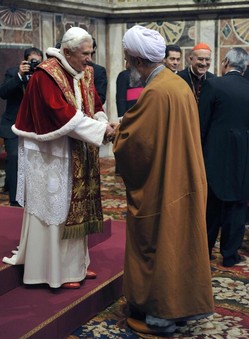What follows are excerpts of an address the Holy Father gave to the
Diplomatic Corps accredited to the Holy See today, January 11. I selected what I thought were some germane points for our consideration.
[…]
The Church is
open to everyone because, in God, she lives for others! She thus shares deeply
in the fortunes of humanity, which in this new year continues to be marked by
the dramatic crisis of the global economy and consequently a serious and
widespread social instability. In my Encyclical Caritas in Veritate, I invited
everyone to look to the deeper causes of this situation: in the last analysis,
they are to be found in a current self-centred and materialistic way of
thinking which fails to acknowledge the limitations inherent in every creature.
Today I would like to stress that the same way of thinking also endangers
creation. Each of us could probably cite an example of the damage that this has
caused to the environment the world over. I will offer an example, from any
number of others, taken from the recent history of Europe. Twenty years ago,
after the fall of the Berlin wall and the collapse of the materialistic and
atheistic regimes which had for several decades dominated a part of this
continent, was it not easy to assess the great harm which an economic system
lacking any reference to the truth about man had done not only to the dignity
and freedom of individuals and peoples, but to nature itself, by polluting
soil, water and air? The denial of God distorts the freedom of the human
person, yet it also devastates creation. It follows that the protection of
creation is not principally a response to an aesthetic need, but much more to a
moral need, in as much as nature expresses a plan of love and truth which is
prior to us and which comes from God.
It is proper, however, that this concern
and commitment for the environment should be situated within the larger
framework of the great challenges now facing mankind. If we wish to build true
peace, how can we separate, or even set at odds, the protection of the
environment and the protection of human life, including the life of the unborn?
It is in man’s respect for himself that his sense of responsibility for
creation is shown. As Saint Thomas Aquinas has taught, man represents all that
is most noble in the universe (cf. Summa Theologiae, I, q. 29, a. 3).
Furthermore, as I noted during the recent FAO World Summit on Food Security,
“the world has enough food for all its inhabitants” (Address of 16
November 2009, No. 2) provided that selfishness does not lead some to hoard the
goods which are intended for all.
I would like to stress again that the
protection of creation calls for an appropriate management of the natural
resources of different countries and, in the first place, of those which are
economically disadvantaged. I think of the continent of Africa, which I had the
joy of visiting last March during my journey to Cameroon and Angola, and which
was the subject of the deliberations of the recent Special Assembly of the
Synod of Bishops. The Synod Fathers pointed with concern to the erosion and
desertification of large tracts of arable land as a result of overexploitation
and environmental pollution (cf. Propositio 22). In Africa, as elsewhere, there
is a need to make political and economic decisions which ensure “forms of
agricultural and industrial production capable of respecting creation and
satisfying the primary needs of all” (Message for the 2010 World Day of
Peace, No. 10).
How can we forget, for that matter, that the struggle for
access to natural resources is one of the causes of a number of conflicts, not
least in Africa, as well as a continuing threat elsewhere? For this reason too,
I forcefully repeat that to cultivate peace, one must protect creation!
Furthermore, there are still large areas, for example in Afghanistan or in some
countries of Latin America, where agriculture is unfortunately still linked to
the production of narcotics, and is a not insignificant source of employment
and income. If we want peace, we need to preserve creation by rechanneling
these activities; I once more urge the international community not to become
resigned to the drug trade and the grave moral and social problems which it
creates.
To carry our reflection further, we must remember that the problem of
the environment is complex; one might compare it to a multifaceted prism.
Creatures differ from one another and can be protected, or endangered, in
different ways, as we know from daily experience. One such attack comes from
laws or proposals which, in the name of fighting discrimination, strike at the
biological basis of the difference between the sexes. I am thinking, for
example, of certain countries in Europe or North and South America. Saint
Columban stated that: “If you take away freedom, you take away
dignity” (Ep. 4 ad Attela, in S. Columbani Opera, Dublin, 1957, p. 34).
Yet freedom cannot be absolute, since man is not himself God, but the image of
God, God’s creation. For man, the path to be taken cannot be determined by
caprice or willfulness, but must rather correspond to the structure willed by
the Creator.
[…]
